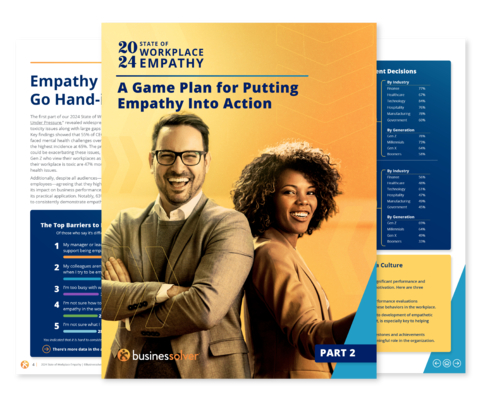Businessolver®, a leader in benefits and HR technology solutions, released A Game Plan for Putting Empathy Into Action, the second part of their 2024 State of Workplace Empathy Study, now in its ninth year.
This press release features multimedia. View the full release here: https://www.businesswire.com/news/home/20240716448406/en/

Businessolver’s 2024 State of Workplace Empathy Report: A Game Plan for Putting Empathy Into Action (Graphic: Business Wire)
The follow-up report responds to this year’s CEO, HR, and employee survey findings, which showed workplace mental health in decline, workplace toxicity on the rise, and significant barriers to executing empathy at work. In addition to providing additional insights on gaps in expectations versus experiences, Part 2 also provides leaders with behavioral-based intelligence for executing empathy in the workplace.
A pervasive mental health stigma and widespread mental health issues were among the most alarming of the study’s findings, with 55% of CEOs and 50% of employees citing a mental health issue in the past year. Workplace toxicity, too, was found to be soaring. Forty-two percent of total respondents and a staggering 52% of CEOs said they work in a toxic environment.
The need for empathetic responses to these workplace issues is clear. Yet, the State of Workplace Empathy Study data shows that empathy, even though highly valued by employees at all levels, is poorly executed.
Employees neither encounter, nor model, empathetic behaviors
Significant gaps exist between the behaviors respondents rated as empathetic and the behaviors they reported experiencing in their workplaces. Even wider gaps exist between the behaviors respondents rated as empathetic and what they’ve demonstrated themselves.
For example, 85% of employees said “Demonstrating that an employee’s family is equally as important as their job” was an important behavior for signifying empathy at work. Just 35%, however, have experienced that behavior from colleagues and supervisors. Even more stark, just 30% say they have exhibited those behaviors themselves, despite all groups reporting that they are “much more empathetic” than four years ago.
Demonstrating empathy across three pillars
Businessolver’s research indicates the foundation of a sustainably empathetic culture rests on the ability to support employees across three pillars: professional, whole person and community. The report includes 20 empathetic behaviors that respondents rated in importance on a five-point scale alongside an analysis of which behaviors are most highly correlated with perceptions of organizational empathy.
“Ideally, organizations should aim for a culture that balances high accountability with high empathy,” said Rae Shanahan, workplace empathy advocate and chief strategy officer for Businessolver. “Without accountability, even a highly empathetic environment can resemble a day care, whereas high accountability without empathy can feel like a boot camp. The best outcomes are achieved when there’s an optimal balance between the two.”
To view both Part 1 and Part 2 of the 2024 State of Workplace Empathy Study, visit www.businessolver.com/empathy.
About Businessolver’s Annual State of Workplace Empathy Study
Since 2016, Businessolver has surveyed a diverse cross-section of more than 20,000 employees, HR professionals, and CEOs across six industries to examine the behaviors and benefits that make a workplace empathetic. In the survey, empathy is defined as “the ability to understand and/or experience the feelings or perspectives of another.” In March 2024, a third-party firm fielded the online survey for the 2024 study among employees, HR professionals, and CEOs within financial services, government, healthcare, hospitality, manufacturing, and technology sectors. To qualify for the survey, respondents needed to be 18 years or older, U.S. residents, employed full-time or part-time within their respective industry at an organization with 100 or more employees. Learn more and find historical trend data from 2016 to today at businessolver.com/empathy.
About Businessolver
Since 1998, Businessolver has delivered market-changing benefits technology the empowers empathetic service supported by an intrinsic responsiveness to client needs. The company creates client programs that maximize benefits program investment, minimize risk exposure, and engage employees with easy-to-use solutions and communication tools to assist them in making wise and cost-efficient benefits selections. Founded by HR professionals, Businessolver’s unwavering service-oriented culture and secure SaaS platform provide measurable success in its mission to provide complete client delight.
View source version on businesswire.com: https://www.businesswire.com/news/home/20240716448406/en/